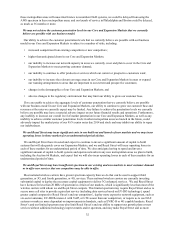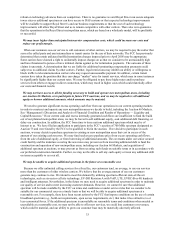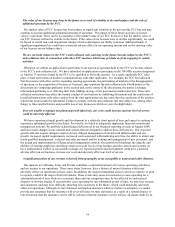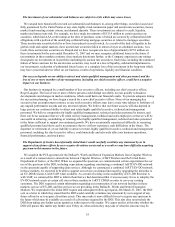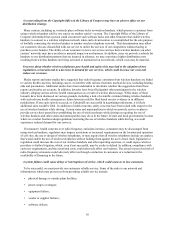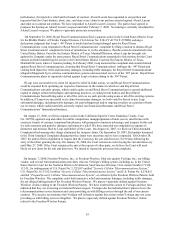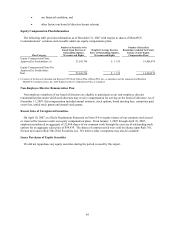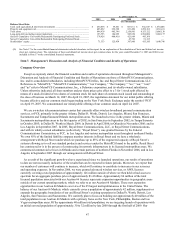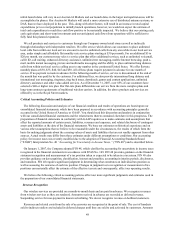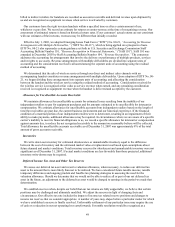Metro PCS 2007 Annual Report Download - page 53
Download and view the complete annual report
Please find page 53 of the 2007 Metro PCS annual report below. You can navigate through the pages in the report by either clicking on the pages listed below, or by using the keyword search tool below to find specific information within the annual report.42
• prohibit stockholder action by written consent, requiring all stockholder actions to be taken at a meeting of our
stockholders;
• require stockholder meetings to be called only by the President or at the written request of a majority of the
directors then in office and not the stockholders;
• prohibit cumulative voting in the election of directors, which would otherwise allow less than a majority of
stockholders to elect director candidates;
• provide that our board of directors is divided into three classes, each serving three-year terms; and
• establish advance notice requirements for nominations for election to the board of directors or for proposing
matters that can be acted upon by stockholders at stockholder meetings.
In addition, Section 203 of the Delaware General Corporation Law imposes restrictions on business
combinations such as mergers between us and a holder of 15% or more of our voting stock. See "Description of
Capital Stock - Anti-Takeover Effects of Delaware Law and Our Restated Certificate of Incorporation and Restated
Bylaws."
Item 1B. Unresolved Staff Comments
None.
Item 2. Properties
We currently maintain our executive offices in Richardson, Texas, and regional offices in Alameda, California;
Folsom, California; Irvine, California; Santa Fe Springs, California; Norcross, Georgia; Plano, Texas; Livonia,
Michigan; Sunrise, Florida; Tampa, Florida; Orlando, Florida; Plantation, Florida; Chelmsford, Massachusetts;
Hawthorne, New York; and Ft. Washington, Pennsylvania. As of December 31, 2007, we also operated over 100
retail stores throughout our metropolitan areas. All of our regional offices, switch sites, retail stores and virtually all
of our cell site facilities are leased from unaffiliated third parties. We believe these properties, which are being used
for their intended purposes, are adequate and well-maintained.
Item 3. Legal Proceedings
On June 14, 2006, Leap Wireless International, Inc. and Cricket Communications, Inc., or collectively Leap, filed
suit against us in the United States District Court for the Eastern District of Texas, Marshall Division, Civil Action
No. 2-06CV-240-TJW and amended on June 16, 2006, for infringement of U.S. Patent No. 6,813,497 “Method for
Providing Wireless Communication Services and Network and System for Delivering of Same,” or the ‘497 Patent,
held by Leap. The complaint seeks both injunctive relief and monetary damages, including treble damages, for our
alleged infringement by our wireless communication systems and associated services of the ‘497 patent. We have
answered the complaint, raised a number of affirmative defenses, and together with two related entities,
counterclaimed against Leap and several related entities and certain current and former employees of Leap,
including Leap’ s CEO. In our counterclaims, we claim that we do not infringe any valid or enforceable claim of the
‘497 Patent and we assert claims for breach of contractual obligations, constructive trust, misappropriation,
conversion and misappropriation of trade secrets, misappropriation of confidential information, and breach of a
confidential relationship. Our counterclaims seek monetary and exemplary damages, and injunctive relief. Certain of
the Leap defendants, including its CEO, have answered our counterclaims, denied our allegations and asserted
affirmative defenses to our counterclaims. In connection with denying a motion to dismiss by certain individual
defendants, the court concluded that our claims against those defendants were compulsory counterclaims. On
October 31, 2007, pursuant to a joint motion by the parties, the Court entered an order administratively closing the
suit. On February 14, 2008, the Court entered an order reopening the action. We plan to vigorously defend against
Leap’ s claims relating to the ‘497 Patent.
We have also tendered Leap’ s claims to the manufacturer of our network infrastructure equipment, Alcatel
Lucent, for indemnity and defense. Alcatel Lucent declined to indemnify and defend us. We filed a petition in state
district court in Harrison County, Texas, Cause No. 07-0710, for a declaratory ruling that Alcatel Lucent is obligated
to cooperate, indemnify, defend and hold us harmless from the Leap patent infringement action and for specific


